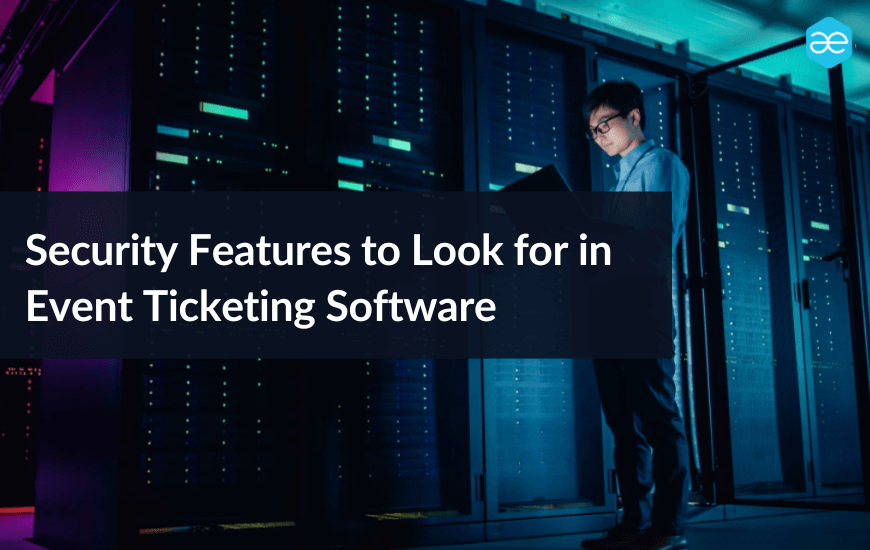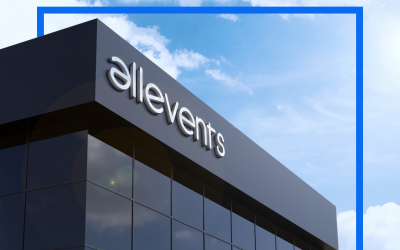When it comes to event ticketing software, security is paramount. Imagine the excitement of creating an awesome event with happening attendees! And then you discover that fees paid by attendees haven’t reached you yet?
As more and more events choose online ticketing, ensuring the safety of ticket sales and attendee information safety has become crucial.
And we surely don’t want this👇 type of headline popping up in the news for your event!
Rising Fraud in UK Live Entertainment Tickets Sales

In this article, we will explore the importance of security in event ticketing system and highlight the key features to look for! Whether you’re an event organizer or a ticket purchaser, understanding these security measures will help you make informed decisions and protect your valuable data.
So let’s dive in and discover security features you should look for while implementing event ticketing software.
1. Data Protection and Privacy

Let’s take an example, Event ticketing software operating in the European Union (EU) must follow GDPR guidelines, which include obtaining consent from users to collect and process their personal data. By these regulations, event ticketing software is committed to protecting user privacy and following legal requirements.
Protecting user data and ensuring privacy is paramount in event ticketing software. These measures ensure that user data has been kept confidential, protected from unauthorized access, and processed lawfully. Thereby enhancing the security and trustworthiness of the ticketing system.
A. Secure storage and encryption of sensitive data
When a user purchases a ticket online, their payment information is encrypted using advanced encryption algorithms before being stored in the ticketing software’s database. This prevents unauthorized access to sensitive payment data. This reduces the risk of data breaches and financial fraud.
2. Secure Payment Processing

Ensuring secure payment processing is of utmost importance when choosing event ticketing software. Let’s delve into the key points and their significance for security:
A. PCI DSS compliance
Event ticketing software should adhere to the Payment Card Industry Data Security Standard (PCI DSS). PCI DSS provides a set of security requirements to protect cardholder data during payment transactions. Compliance ensures sensitive payment information is processed and stored securely.
This involves:
- Implementing strong security controls
- Conducting regular audits
- Maintaining a secure network infrastructure.
By being PCI DSS compliant, event ticketing software provides a robust layer of protection for payment transactions, reducing the risk of data breaches and unauthorized access to sensitive cardholder information.
B. Integration with trusted payment gateways
Event ticketing software should integrate with trusted and reputable payment gateways. These payment gateways act as intermediaries between the ticketing platform and financial institutions. They securely handle the payment process. By trusted payment gateways, event ticketing software benefits from their advanced security features. We can say that it is good at handling sensitive payment data.
Integration with trusted payment gateways ensures that payment transactions are conducted securely. Plus, sensitive payment information is transmitted and stored in a protected manner.
Regarding payments, with AllEvents, you can easily collect payments through PayPal and Stripe, which are trusted throughout the globe! Plus, we never hold onto your money, ensuring you won’t have to endure any delays in receiving your payments. Enjoy the convenience of instant access to your money!

C. Secure transactions
When a user purchases a ticket through event ticketing software, their payment details, including credit card information, are encrypted using SSL/TLS protocols. The data is securely transmitted to the payment gateway for processing. This ensures that sensitive information remains protected throughout the transaction process.
Event ticketing software should focus on secure transactions using encryption technologies. This includes Secure Sockets Layer (SSL) or Transport Layer Security (TLS). These protocols encrypt the data exchanged between the user’s browser and the ticketing. This prevents unauthorized interception and tampering.
3. Securing User Authentication
Let’s say Alex wants to purchase tickets for a music festival. She logins to the event ticketing platform using their username and password. The platform prompts them to enter a verification code sent to their registered mobile number. Alex enters the code, completing the two-factor authentication process. An extra layer of security ensures only Alex, the legitimate user, can access their account.
A. Password encryption and complexity requirements
“Passwords in event ticketing software are encrypted” means that they are transformed into unreadable text using advanced algorithms. This protects user passwords from getting exposed in case of a data breach.
B. Single sign-on capabilities
SSO allows users to access many systems or platforms with a single login credential. For example, users who have already authenticated themselves on a trusted platform can access the event ticketing software without entering their credentials again. This reduces the risk of password-related vulnerabilities and simplifies the user experience.
4. Fraud Prevention Measures
Implementing robust fraud prevention measures is essential in event ticketing software. Let’s explore the key points and their significance for security:
Event ticketing software should use advanced fraud detection algorithms and filters. Identify and prevent fraudulent activities. These algorithms analyze various parameters and patterns in ticket purchases.
For example, People can quickly flag many ticket purchases from the same IP address. Or identify unusual purchasing patterns that deviate from typical user behaviour.
5. Access Control and Permissions

Implementing effective access control and permissions is crucial in event ticketing software. Let’s explore the key points and their significance for security:
A. Role-based access control
Event ticketing software should use role-based access control (RBAC). This assigns specific roles and permissions to different user types or groups. RBAC ensures that users have access only to the functionalities and information necessary for their respective roles.
Administrators may have elevated privileges to manage events and user accounts. While regular users may have limited access to ticket purchases and viewing event details.
B. User permission settings
User permission settings enable fine-grained control over user access. This ensures that only authorized individuals can perform specific actions. Plus, access sensitive information within the ticketing software.
C. Audit logs and activity tracking
By monitoring and logging user actions, event ticketing software can detect suspicious or unauthorized activities and trace them back to the responsible users.
Audit logs and activity tracking are crucial in forensic investigations, compliance audits, and identifying potential security breaches. They provide valuable information for analyzing incidents and taking appropriate actions to mitigate risks.
For example, audit logs can help track the user’s activities during a security breach. This provides critical evidence for investigation and remediation.
6. Secure Communication Channels

Ensuring secure communication channels is vital in event ticketing software. Let’s explore the key features and their significance for security:
A. Encryption for website and API communication
Event ticketing software should employ encryption protocols, such as HTTPS (Hypertext Transfer Protocol Secure), to encrypt the communication between the website or application and users’ browsers. Encryption protects the data exchanged during the browsing session, including user credentials and sensitive information, from being intercepted or accessed by unauthorized parties.
Similarly, if the ticketing software offers an Application Programming Interface (API) for integrations, it should use encryption to secure the data transmitted between the software and external systems. This prevents data breaches and ensures the confidentiality and integrity of the exchanged information.
B. Secure email notifications
Event ticketing software should utilize secure email protocols, such as SMTP over TLS (Transport Layer Security), to ensure that email notifications sent to users are encrypted during transmission.
By implementing secure email notifications, event ticketing software ensures that sensitive information, such as ticket purchase confirmations or account-related notifications, remains confidential and protected.
C. Encrypted messaging features
If the ticketing software incorporates messaging features, it should employ encryption to secure user messages.
By offering encrypted messaging features, event ticketing software fosters secure communication between users, such as event organizers and attendees, while maintaining the confidentiality of sensitive discussions or information shared within the platform.
For example, when a user logs into the event ticketing platform, the website’s URL starts with “https://” instead of “http://,” indicating a secure connection. Any data transmitted, such as login credentials or payment information, is encrypted to prevent unauthorized access.
By employing these measures, the software protects user data, maintains confidentiality, and safeguards the integrity of communication channels, enhancing overall security and ensuring a trusted environment for users.
7. Disaster Recovery and Backup
You are exploring all the benefits of event ticketing software; suddenly, the unexpected occurs—a catastrophic system failure! Disaster doesn’t knock on doors!
So, disaster recovery and backup mechanisms are essential in event ticketing software. Let’s explore the key points and their significance for security:
A. Regular data backup
Event ticketing software should regularly back up the data stored within the system. These backups ensure that the ticketing software can restore the data to a previous state in case of data loss or system failure. Regular backups help protect against accidental data deletion, hardware failures, or other unforeseen events that may result in data loss.
B. Redundancy and failover measures
Event ticketing software should incorporate redundancy and failover measures to ensure continuous availability and minimal downtime. Redundancy involves having duplicate or backup systems in place, while failover mechanisms automatically switch to alternate systems in case of failure.
C. Disaster recovery plans
Event ticketing software should have well-defined disaster recovery plans in place. These plans outline the steps and procedures to be followed in case of a system failure, data breach, or other catastrophic events. Disaster recovery plans typically include strategies for data restoration, system recovery, and communication with stakeholders.
For example, a disaster recovery plan may outline procedures for restoring data from the latest backup, activating redundant servers, and notifying users and stakeholders about the situation.
Final Thoughts and Recommendation
The security features mentioned above are optional and essential for any event ticketing software. By implementing these features, event ticketing platforms can protect user data, enhance trust among event organizers and attendees, and minimize the risk of security breaches or fraudulent activities.
It is recommended that event ticketing software providers prioritize security in their development and continuously update and enhance their security measures to stay ahead of emerging threats. Regular security assessments, adherence to industry standards, and keeping users informed about security practices will foster a secure and reliable ticketing experience.
Security Feature In Event Ticketing Software FAQs:
Why is user authentication important in event ticketing software?
User authentication ensures only authorized users can access the ticketing system, preventing unauthorized access and protecting sensitive information.
How does secure payment processing contribute to security in event ticketing software?
Secure payment processing, including PCI DSS compliance and integration with trusted payment gateways, ensures that financial transactions are conducted safely and securely, safeguarding users’ payment information.
What is the significance of disaster recovery and backup in event ticketing software?
Disaster recovery and backup mechanisms protect against data loss and system failures, enabling quick recovery and minimizing disruptions to ticket sales and event management.
What is two-factor authentication in an event ticketing platform?
Two-factor authentication adds an extra layer of security by requiring users to verify their identity through a second factor, such as a code sent to their mobile device, in addition to their username and password.
How does password encryption protect my data?
Password encryption transforms passwords into unreadable text using advanced algorithms. This protects your password from being exposed in case of a data breach, enhancing the security of your account.
What is an event ticketing system’s single sign-on (SSO) security feature?
Single sign-on allows users to access multiple systems or platforms with a single set of login credentials. It reduces the need to enter credentials repeatedly and enhances the user experience while minimizing the risk of password-related vulnerabilities.
What is GDPR compliance?
GDPR (General Data Protection Regulation) is a set of data protection regulations that require event ticketing software to obtain user consent for collecting and processing personal data. Compliance with GDPR ensures user privacy and legal requirements are met.
How do trusted payment gateways enhance security in event ticketing software?
Integration with trusted payment gateways adds an extra layer of security to event ticketing software. These gateways securely handle the payment process, protecting sensitive payment data and ensuring secure transactions.
Why should I prioritize security when choosing event ticketing software?
Prioritizing security in event ticketing software protects your personal data, enhances trust in the system, and reduces the risk of security breaches or fraudulent activities that could compromise your information.
What can organizers do to protect attendee information?
Event organizers can protect attendee information by using event ticketing software with strong security features, ensuring compliance with data protection regulations, and implementing access controls and permissions to limit unauthorized access.







